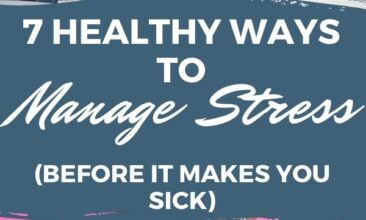Stress is a powerful force, and if left unmanaged, it can actually cause serious, long-term health concerns. These are the healthy stress management practices that we aim for in our home.
 Being an adult means that you can eat ice cream at midnight if you want to (i.e. what my kids plan to do when they’re grown up), but it also means a hefty dose of responsibility.
Being an adult means that you can eat ice cream at midnight if you want to (i.e. what my kids plan to do when they’re grown up), but it also means a hefty dose of responsibility.
My husband and I are celebrating our 15th wedding anniversary this May, and in our time together we have weathered a lot of hard seasons. There were years of being very low income, various illnesses, unemployment, high-stress work environments, many moves – including across the country and back, criminal harassment from an unstable landlord, having babies (first three in less than four years), high-needs infants resulting in intense sleep deprivation, and marital struggles.
You know – the usual. 😉
As much as I’d like to insulate myself in a magical cocoon of health, comfortable finances, and happy relationships, I haven’t quite figured out how to do that yet. Sometimes the stress of these challenges gets utterly overwhelming.
Thankfully, human beings are wired to adapt and handle stress.
When faced with “danger” (ie. any kind of stress), a part of the brain called the amygdala sends a signal to another part of the brain called the hypothalamus, which immediately takes charge like a drill sergeant, communicating with all parts of the body to fight or flee.
One of the many parts of the body that is activated in this moment is the adrenal glands, which we’ve talked about many times around here. The adrenal glands release epinephrine (more commonly known as adrenaline), which initiates the fight or flight response to keep you safe.
Unfortunately, when stresses occur too frequently, and your brain is in a continual state of “danger mode”, you are at risk for a number of serious health complications.
Long-term, frequent stress can lead to health concerns such as:
- weight gain
- unexplained body aches and pains
- inability to handle everyday life stresses – the tendency to “snap”
- heart issues
- mental distress (anxiety, depression, and more)
- a weakened immune system
- digestive issues
- sleep issues
- cognitive impairment

Sometimes I find myself in a season where the hard things seem to be piling up. I’m sure many of you can relate.
To be honest, I had my husband, Chris, in mind when I thought of writing this in the first place. Stress hits his physical health pretty hard, and since I’d kind of like to keep him around for the long-term, I’m super motivated to help him be proactive about it.
When you’re in a particularly stressful season, it’s extremely important to be mindful of how you are managing that stress, and what kind of self-care measures you’re practicing. Of course, most of the items on this list are excellent choices for regular stress maintenance as well – you don’t have to wait until a crisis hits. (In fact – it’s best that you don’t.)
By keeping regular tabs on your stress levels, and incorporating the healthy stress management practices below, you’ll avoid the downward spiral toward total and complete burnout.
Now, a caveat! If you’re anything like my husband (a Type-A “get ‘er done” sort of person), then think of the things below as your personal to-do list. Think of them as an obligation. Do what it takes to elevate them in priority, because if you don’t – you will eventually pay for it with your health.
Obviously we can’t just avoid stress altogether because life doesn’t work that way, but there are things we can do to support ourselves in the meantime. These things make all the difference in the world as to how our bodies can handle the stress we do face in a world that’s (shocker!) not always perfect.
Healthy Stress Management: 7 Things to Try
1. Breathing and meditation
There are a few different options such as Headspace (a free app that sends a soothing Aussie voice into your ears, telling you to close your eyes, take deep breaths, and release the tension from your body), yoga (check out 20 Reasons to Start Practicing Yoga and Yoga with Adrienne for free on YouTube), and Calm, a website with a large variety of stories and meditations. You may also be interested in this post on inviting peace and silence into your day.
2. Exercise
Exercise naturally relieves stress by releasing oxytocin into the body and melting away tension, and I’ll tell you right now: this one is my husband’s clear favourite.
A couple of years ago, he came home one day with a “guess what!” face. He found a quality no-frills gym called Fit4Less near our house that is a fraction of the cost of other gyms. He signed up, and has been a happy user ever since.
 Despite the fact that I’ve totally taken over our family budgeting in the last few months (for the first time ever) and I’m most definitely not a spender, I find it easy enough to make room in the budget for this.
Despite the fact that I’ve totally taken over our family budgeting in the last few months (for the first time ever) and I’m most definitely not a spender, I find it easy enough to make room in the budget for this.
For such a low price (starts at $4.99 every two weeks, plus a small joining fee), we get a heck of a lot of bang for our buck in terms of stress relief, not to mention the obvious health benefits.
Which, by the way, is great… because running a super tight “budget ship” is very important to our family finance goals right now, and superfluous spending stresses me out! (Sheesh, it’s way too easy to fall into a negative stress cycle, isn’t it?!)
Since this one is his favourite, and since he finds it tough to schedule in while balancing work and home life, I added it to the calendar on his behalf twice a week, set up reminders, and encourage him to go – guilt-free.

3. Therapy
Perhaps you need to learn to create some margin and boundaries in your life, or maybe you need to lighten your emotional backpack by talking through some “stuff” in a calm, non-judgmental environment.
Seeing a counsellor can honestly be one of the most emotionally refreshing things to do for yourself, and your relationships with your loved ones. It can be for a season, or ongoing – whatever suits you. Counseling is something that I believe everyone can benefit from, so if you haven’t tried it before, I encourage you to consider it.
4. Essential oils
As I learned a number of years ago, essential oils aren’t just about smelling nice. They are highly-concentrated plant compounds with powerful medicinal properties.
There are certain essential oils that have been clinically proven to affect the brain and reduce stress, such as lavender, sandalwood, ylang-ylang, and more.
5. Good nutrition + H2o
This may be an obvious addition to the list, but sadly it’s also an often-neglected one. Binging on junk food when you’re in a season of stress may feel good in the moment, but it sets you up for being chronically sick and tired in the long run. Of course, this is pretty well the opposite of what you want when you’re already stressed out.
6. Supplements
You should speak to your healthcare provider to figure out which supplements are right for you. (I, personally, prefer a functional medicine practitioner or a naturopath for this.) However, there are two supplements in particular that the majority of people are deficient in, which affect how your brain handles stress.
These two supplements are magnesium (depleted by stress, and necessary to a wide variety of body functions) and fish oil (practically everyone would benefit from more omega 3’s).
7. Decluttered environment
Research has shown a direct link between clutter and stress levels, so if your house needs a solid dose of decluttering, it could be contributing to your stress levels. I feel this acutely, and am currently in a major decluttering phase.
I’m definitely an aspiring minimalist, in the sense of owning things thoughtfully, and choosing to step out of the consumer mentality . Every time I declutter a cupboard, a shelf, or a room, it’s like a little bit of the stress that I’m carrying is exhaled, and fades away.
These are the healthy stress management practices that we aim for in our home. What are yours?
Looking for more?
- Check out Self-Care for Dudes (7 Things You Can Do to Help De-Stress Your Guy)
- Everyday Tips to Keep Your Cool (5 Easy Ways to Relieve Stress Even on Your Busiest Days)
- 5 Tips for How to Avoid The Winter Blues
- A Small-but-Mighty Morning Habit to Transform Your Day
This is a sponsored conversation written by me on behalf of Fit4Less. The opinions and text are all mine.
Bonus: get more sleep!
[cboxarea id=”cbox-Aq7RKoxYuTnUXeAV”]


























Amit Sharma
I am agree with all the 7 points but I appreciate you added Good Nutrition in your list also. Because according to me healthy food and water is most important for stress management.
Sierra
Number 7 gets me all the time. For some reason when my living space is cluttered I feel overwhelmed and can easily get stressed out. I love these tips and will be putting them to use!
Danica
Hi, Beth!
Thanks for sharing this tips on stress management. Although stress is natural and a definite part of life, I agree that we should not let it consume us. A bit of stress from time to time can still be considered healthy but if it takes a toll on your life and health, that becomes a problem.
I love all the tips you shared especially the decluttering part. Like you, I am an aspiring minimalist (but fails horribly at it, to be honest). I find relief and joy whenever I see clean up some space at home. Keep up the good work!
All the best,
Danica